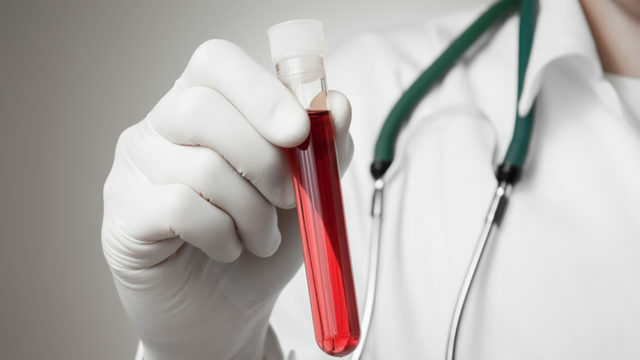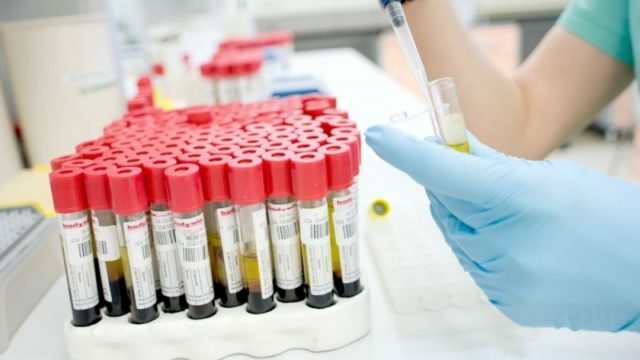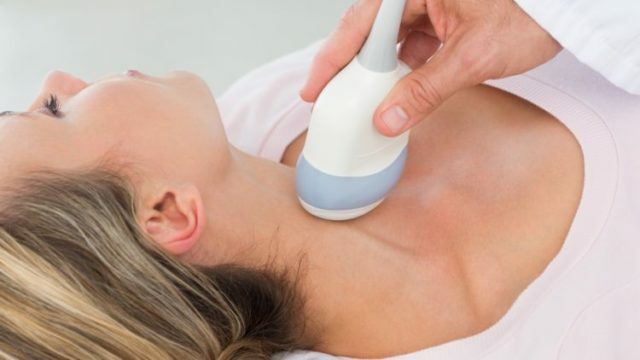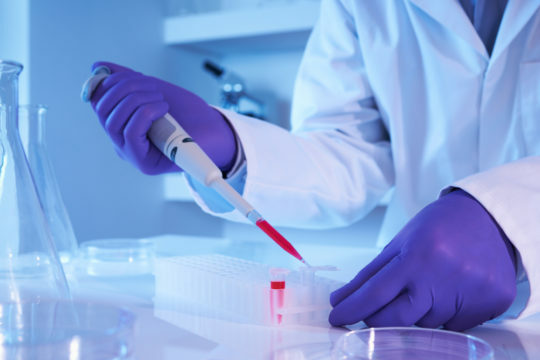The thyroid gland produces hormones that the body needs to function properly. Hormones of thyroid are involved in metabolic processes, in the work of the cardiovascular system, the gastrointestinal tract, the central nervous system. In order for the gland to function properly and the hormones fulfill their function, thyroid synthesis( T4) and triiodothyronine( T3) occurs in the thyroid gland. For the synthesis of these two hormones to take place, the presence of the so-called building material - thyroglobulin is necessary.
Thyroglobulin norm after removal of thyroid
The thyroid organ consists of follicles, inside of which is a substance of transparent color. One of the important components of this viscous substance is thyroglobulin or colloid. Thyroglobulin is a protein that is stored in the follicle store. When a need arises in it, the cells of the thyroid gland extract colloids from the follicles and promote their decay into constituent parts. In the blood, thyroglobulin is contained in a small amount, its main part is in the lumens between the follicles. If a colloid is released into the blood in large quantities, it leads to destruction of the thyroid gland tissues. One of the options for treating this process is the removal of the organ.
After removal of the thyroid gland due to the appearance of an oncologic neoplasm, the norm of thyroglobulin is classified as oncomarker. The thyroglobulin norm should be zero after removal of the thyroid gland. If, after a certain time, the thyroglobulin level rises, this indicates the presence of cancer cells in the body. It is not necessary to take the blood test to the level of the colloid immediately after the operation, it should take at least two months.
Rules for the analysis of TG
In order to follow the dynamics of thyroglobulin levels, the following principles should be adhered to when passing a blood test:
- Blood delivery should occur after three months after surgery. Premature laboratory tests can give incorrect results about a relapse of thyroid cancer;
- For the reliability of the result, the patient should not take thyroxine for about three weeks;
- Based on the results of the tests, the physician should follow the dynamics of TG.If this indicator gradually decreases, we can draw conclusions about the positive trends in treatment.
Assay for antibodies to thyreoglobulin
The immune system is a protective system of the body on which it depends, whether a person falls ill or not when viruses and bacteria enter the body. Antibodies of the immune system recognize the alien object and destroy it. However, if the system fails, the antibodies begin to neutralize thyroglobulin. To determine the autoimmune diseases of the thyroid gland, the patient is tested for antibodies to thyroglobulin.
Assay for antibodies to thyroglobulin is assigned to confirm or disprove the following pathologies:
- Presence of diffuse goiter;
- Thyroid cancer;
- Thyroiditis Hashimoto.
In addition, antibody analysis is administered to patients after removal of the thyroid gland. In order for the results of the laboratory study to be reliable, the following rules must be observed: blood sampling should be performed on an empty stomach;30 days before the test, it is necessary to stop taking hormonal drugs. Iodine-containing medications can not be taken at least a week before blood donation. If possible, limit physical activity and avoid nerve stress. It is not recommended to take this analysis after a viral disease, sore throat, surgical interventions.
When a removal of the
is required. Thyroid removal may be a necessary step in detecting a tumor or a significant increase in goiter. The causes of diseases of the thyroid gland can be:
- Genetic predisposition;
- Low environmental assessment;
- Untreated infectious diseases;
- Taking certain medications for a long period of time.
- In thyroid disease, a person experiences a number of symptoms:
- Increased fatigue;
- Sleep disorder;
- Weight gain for no apparent reason;
- In men, baldness is observed;
- Increased sweating;
- Elevated blood pressure and cholesterol level in the blood;
- Harsh voice;
- Decreases performance.

Often, patients themselves discover a small swelling in the neck, and only then consult a doctor. To make a reliable diagnosis, the endocrinologist directs the patient to the following studies:
- Blood test for thyroid hormone levels;
- Ultrasound examination of thyroid and lymph nodes;
- Computed tomography of the upper chest and neck;A biopsy of the thyroid gland and lymph nodes.
If, according to the survey, the disease requires surgical intervention, the patient is assigned an operation date. Currently, surgical intervention can be carried out in the following ways:
- Removal of neoplasm with preservation of the main part of the gland;
- Removal of one of the thyroid glands with the left of the isthmus;
- Complete removal of the endocrine organ and adjacent lymph nodes.
The type of surgery depends largely on the type of disease. For the complete removal of the thyroid gland, the following indications should be given:
- Malignant tumor;
- Increased diffuse goiter;
- Adenoma;
- Neoplasms of a good quality.
The operation to remove the thyroid gland is on stream and is not particularly complicated. Disability in the absence of complications is not appropriated, the patient is discharged for 7 days. After the operation, patients should take the hormone drug Thyroxine for the rest of their lives. The drug is able to replace the hormones produced by the thyroid organ. The endocrinologist helps to choose the necessary dosage depending on the individual structure of the organism.

During the postoperative period the patient will experience the following inconveniences:
- Swelling in the area of the postoperative suture;
- A hoarse voice;
- Pain sensations in the back of the neck;
- Soreness when swallowed.
According to statistics, most of the operations do without complications, after about a month only a scar on the lower part of the neck will remind of an unpleasant event.
After the removal of the thyroid gland for various reasons, the life of the patient does not end there. The only inconvenience can be considered lifelong reception of hormonal preparations. After three months after surgery, the patient is assigned a thyroglobulin test. The norm of thyroglobulin in a person with a remote thyroid gland should be reduced and approach zero. If this analysis was carried out too soon after the surgery, the indicator will be unreliable. This can cause an erroneous diagnosis of the presence of cancer cells in the body.
The thyroglobulin test is not administered universally. Often endocrinologists write out the direction along with the determination of the level of thyroid hormones. This is not entirely correct, laboratory research shows an overestimated protein result, thereby misleading the doctor and the patient about his health. Therefore, patients with thyroid disease need to know that this analysis should be given only to those patients who have had a malignant tumor or thyroid gland removed altogether.





